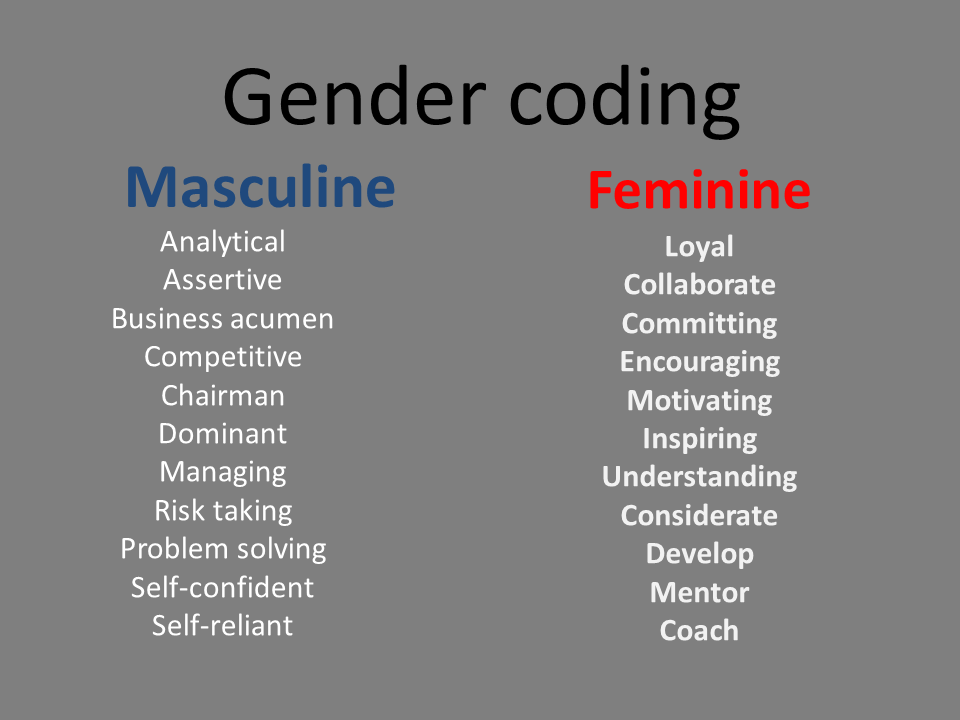Gender De-coding and unconscious bias
Corporate culture and communication generally has a male tone. Whether it’s job adverts and postings, job descriptions, feedback and review forms or employee engagement and reward terminology. The HR world is awash with phrases such as champion, ninja, winner, hero, scrum master and black belt. It’s hardly surprising that some women or introverts can be deterred from putting themselves forward for new positions. This has result a demand for gender de-coding of all these documents. So although we haven’t seen adverts with “male applicants only” for over 40 years, there is subconscious use of masculine coded language which will cause many women to de-select themselves.
This is known as “second generation discrimination.” To counteract this, there has been a demand for gender de-coding of job adverts. With a growing demand to strengthen the female talent pipeline every facet is being investigated.
Masculine language
Research in Personality and Social Psychology 2011 and also published by Duke University and the University of Waterloo, suggests that women are discouraged from applying for jobs if the posting uses masculine coded language. “Independent”, “self-confident” and “decisive” are three examples of male wordings that may put off some women from applying for a job. However, men seem to not be affected if a job description uses feminine words like “considerate”, “collaborate” and “loyal”.
This research has generated commentary around the construction of gender neutral adverts and the need for gender de-coding. A number of apps have been developed to monitor the gender bias of job advertisements, to offset indications that many organisations are unintentionally using language which will turn off female candidates. These algorithms then count the number of gender-coded words to determine if there is a bias in any direction.
 Using two software apps I ran two adverts I had created through Textio and Kat Matfield’s Gender Decoder. One was for a Managing Director in the B2B heavy industry sector – very male dominated. The other was a mid-level change management consultant. Despite my best efforts, they both contained some masculine coded words. Leadership, manage, business acumen and analyse are highlighted as being masculine coded.
Using two software apps I ran two adverts I had created through Textio and Kat Matfield’s Gender Decoder. One was for a Managing Director in the B2B heavy industry sector – very male dominated. The other was a mid-level change management consultant. Despite my best efforts, they both contained some masculine coded words. Leadership, manage, business acumen and analyse are highlighted as being masculine coded.
Matfield provides a full list check list of male and female gender coded words.
Band-aid policy
The MD role is a senior position and indicates an MBA is desirable.This is not an inflated requirement, as I am strict about over egging the job advert omelette. I used the term “business acumen” which was highlighted as being a male coded term. The alternatives offered were “business understanding” and “business sense.”
Are they best use of the English language? I’m not so sure. We’re talking about running a multi-million SME not a monthly allowance.
Can you really write an accurate job description for a senior role without using at least some words that are considered to be male coded, without over simplification? They have masculine connotations now, because not many women have been in these roles until recently. Leadership is currently a male coded word.There is no reason it should be and especially no reason to stay that way. We have to be careful about getting into revisionist language policies reminiscent of communist Russia with the selection of, for example, female friendly leadership synonyms, which may not convey the same message. We are so unused to female leaders – we even call them “women leaders.” One senior HR Director said they were considering replacing the job title “Team Leader” with “Team Coach”
This is about gaining an understanding of our own unconscious biases, not just treating the symptoms. We can’t eradicate those biases, but we can learn to become aware of them and manage them. We need to tackle the root causes of the problem, at the same time as treating the symptom.
Women’s input
I spoke to some senior women for their opinions. They thought the process of gender de-coding job adverts was really helpful, especially at at mid-junior levels, when women are unfamiliar with business language, and could be overwhelmed and maybe deterred by its usage. They all advocated the use in their own organisations. At a senior level care has to be taken for language not to be reductive.
They also believe at the same time that it would be more effective to educate women to be gender bi-lingual. They would then feel more comfortable with what is currently being perceived as masculine language, such as “leader”. It’s interesting that men are not put off by feminine coded language. They added hiring managers and HR should stop the inflation of qualifications and experience levels of these postings, which they believe are a greater deterrent to women to put themselves forward for jobs and promotions. The focus should be on what the job holder can do in real terms; “Motivate a team to meet business goals ” is more compelling than “dynamic leadership skills required”
I passed this idea on to some HR contacts and they agreed. I also asked them their thoughts about adding a line suggesting that “those without all the stated qualifications could still apply.” This policy is favoured by many to encourage female applicants. They all groaned. “We would be inundated with under/over qualified applicants.”
The field of gender balance is fraught with conflicting opinion.There is no doubt that job adverts need to be made more accessible to some women, although not all women are deterred by language use. But not at the expense of dumbing down. That is patronising.
But please….. the use of “Ninja” and “Black Belt” should be stopped NOW!
If your organisation wants to strengthen the female talent pipeline – read here.






Pingback: 7 ways to hire more women - 3Plus International
Pingback: How to attract female talent for your jobs - 3Plus International